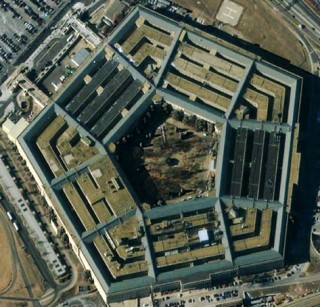
– David M Kennedy of Stanford Univeristy: “The army is at war, but the country is not. We have managed to create and field an armed force that can engage in very, very lethal warfare without the society in whose name it fights breaking a sweat.” The result, he said, is “a moral hazard for the political leadership to resort to force in the knowledge that civil society will not be deeply disturbed.”
Before the Sept. 11, 2001, terrorist attacks, “Americans were called upon by their leaders to pay higher taxes during a war, and grumbling or not grumbling, they did it,” said Robert D. Hormats, the under secretary of state for economic, energy and agricultural affairs and the author of “The Price of Liberty: Paying for America’s Wars.”
(Bumiller, July 24, 2010, NYT) –
By Sherwood Ross
The Washington Post’s revelations re the amazing growth of the U.S. intelligence community since 2001—so that we now have 1,271 agencies employing more than 854,000 payrollers—makes no sense, until one recognizes that this vast development must be for offensive, not defensive, purposes. The explosion in the spy budget from $30 billion to $75 billion since 9/11 is perplexing until you realize it only parallels what is happening across the broad spectrum of the military-industrial complex. Everywhere you turn, everywhere you look, American militarism is on the march like a thousand Sousa bands blaring at once. According to a report of the Stockholm Internatonal Peace Research Institute, U.S. military spending for 2009 accounted for 43% of the world total, followed by China, with 6.6%; France, 4.2%; and U.K. with 3.8%
Where the U.S. allocated “only” $272-billion for “defense” in fiscal year 2000, today’s “defense” budget is $711 billion. The U.S. Navy, for example, is larger than the next 11 navies of the world combined. At the same time, spending on research involving biological warfare has zoomed steadily since 9/11 to a cumulative total exceeding $50 billion even though no nation poses such a threat to the U.S., and even though the deadly anthrax attacks of October, 2001, emanated not from the Middle East but from Ft. Detrick, Md., a base whose operations are run by the Pentagon, not Osama bin Laden. Again, illustrating USA’s aggressive priorities, the National Institutes of Health of Bethesda, Md., is now spending more money on biological warfare—-which killed a total of five Americans in the last decade—than it spends on research to prevent ordinary flu, which does kill 36,000 Americans every year. To its credit, Moscow shuttered its germ warfare ops years ago. Recall, too, that when the Pentagon’s snoops got to Iraq, they found Saddam Hussein but they couldn’t find a single germ. So what’s the big buildup for?
At any given time, the Pentagon has about $1 trillion or more in ongoing research to refine existing, (example: nuclear bombs) and to create new, (example: robots) killing machines to dominate the planet militarily. The vast intelligence apparatus The Post uncovered (The National Security Agency alone is sifting through more than 1.7 billion telephone calls and e-mails daily), makes no sense when the only enemies are a handful of shoe bombers. It makes perfect sense, though, when the Pentagon is intimidating the world by ringing it with 800 bases in 130 countries (plus 1,000 at home), and when the intelligence build-up is companion to the military build-up. Thus it was the U.S. eavesdropped on the private telephone conversations of high United Nations officials then debating whether to support the impending U.S. invasion of Iraq. That’s not using intelligence for defense.
In an article on the Middle East wars, Elisabeth Bumiller of The New York Times July 25th quotes historian David Kennedy of Stanford as saying: “The army is at war, but the country is not. We have managed to create and field an armed force that can engage in very, very lethal warfare without the society in whose name it fights breaking a sweat.” The result, he said, is “a moral hazard for the political leadership to resort to force in the knowledge that civil society will not be deeply disturbed.” Precisely!
Quoted in the New York Times of the same day, Stephen Daggett, a writer for the Congressional Research Service, said, “You think of war as not being the usual state.” That may well be true of many a republic, but it is not true of an empire, particularly the American Empire. According to the historian Edward Gibbon, the Roman emperor Aurelian, embroiled in numerous wars, complained in a private letter, “Surely, the gods have decreed that my life should be a perpetual warfare.” Of course, it need not have been thus except that Aurelian felt obliged to keep his foot on the neck of Rome’s subject peoples. It need not be thus for America, either.
(Sherwood Ross worked in the U.S. civil rights movement and reported for major dailies and wire services. He currently runs a public relations firm for good causes. Reach him at sherwoodross10@gmail.com)

Sherwood Ross is an award-winning reporter. He served in the U.S Air Force where he contributed to his base newspaper. He later worked for The Miami Herald and Chicago Daily News. He contributed a weekly column on working for a major wire service. He is also an editorial and book publicist. He currently resides in Florida.
ATTENTION READERS
We See The World From All Sides and Want YOU To Be Fully InformedIn fact, intentional disinformation is a disgraceful scourge in media today. So to assuage any possible errant incorrect information posted herein, we strongly encourage you to seek corroboration from other non-VT sources before forming an educated opinion.
About VT - Policies & Disclosures - Comment Policy



